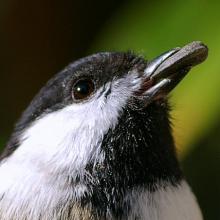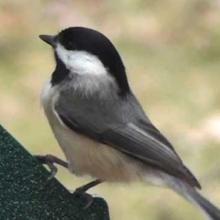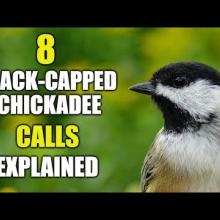

Join BirdNote tomorrow, November 30th!
Illustrator David Sibley and actor H. Jon Benjamin will face off in the bird illustration battle of the century during BirdNote's Year-end Celebration and Auction!
A chickadee comes in to the feeder, quickly grabs a seed, and flies away. It may return immediately, but it's more likely to wait its turn. When a whole flock of chickadees moves into the yard, it looks as if they form a living conveyer belt. One chickadee after another flies to the feeder and leaves with a seed. The birds take turns rather than squabbling over the seeds. Watch for the Black-capped Chickadee in the North and East, the Mountain Chickadee in the Rockies, the Carolina Chickadee in the southeastern quarter of the US, and this Chestnut-backed Chickadee in the West and Northwest.
BirdNote®
Why Do Chickadees Come and Go?
Written by Dennis Paulson
This is BirdNote!. [Black-capped Chickadee calls]
Whether Mountain Chickadees in the Rockies, Black-caps in New England, or Chestnut-backs in the Northwest, chickadees are always worth watching at your feeder. If you’ve laid out a fine feast of sunflower seeds, you’ll see them come in, quickly grab a seed, and fly away. If you watch carefully, you’ll see one land nearby, open the seed, and eat the juicy and nutritious kernel within. [Chickadee pounding on seed]
Now keep watching that chickadee. It may return immediately, but it’s more likely to wait its turn. When a whole flock of chickadees moves into your yard, it looks as if they form a living conveyer belt. One chickadee after another, flies to the feeder and then leaves with a seed. [Black-capped Chickadee calls]
When they find a concentrated supply of food, such as a tray of sunflower seeds, the birds are better off taking their turns than all coming in at once and squabbling over the seeds. Nature seems to prefer order to chaos. And we have much to learn from the chickadees. [Black-capped Chickadee calls]
For BirdNote, I’m Mary McCann.
This April BirdNote listeners are going on a spring migration adventure in the Texas Hill Country — and you can join us! Trip details and more at at Birdnote.org.
###
Call of the Black-capped Chickadee provided by The Macaulay Library at the Cornell Lab of Ornithology, Ithaca, New York. Recorded by R.S. Little and S.R. Pantle.
BirdNote's theme music was composed and played by Nancy Rumbel and John Kessler.
Producer: John Kessler
Executive Producer: Chris Peterson
© 2015 Tune In to Nature.org January 2018/2019/2021 Narrator: Mary McCann
ID# 010907BCCH4KPLU BCCH-05b









